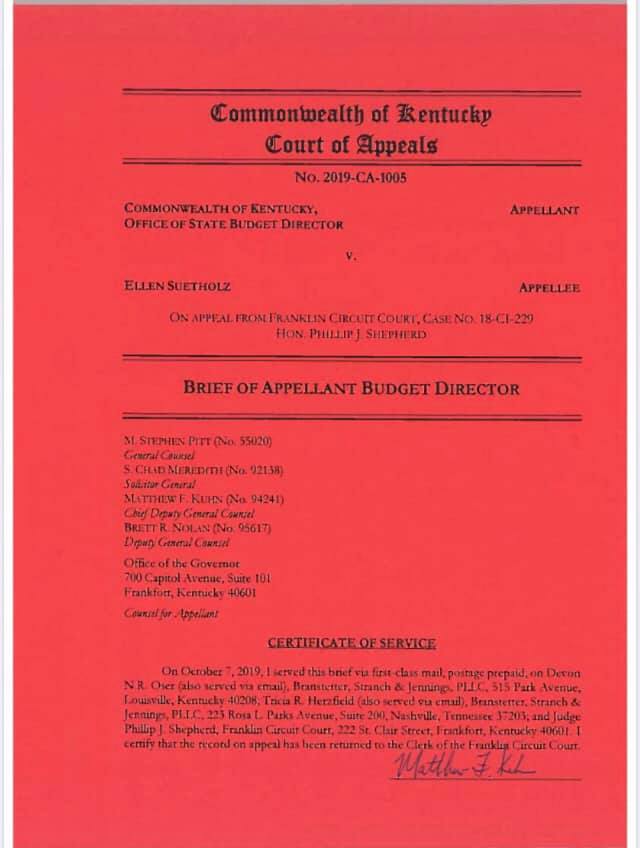
The Governor's legal team, as counsel for the State Budget Director, submitted a brief to the Kentucky Court of Appeals on October 7 in Commonwealth of Kentucky, Office of the Budget Director v. Ellen Suetholz. The open records disputes centers on the public's right of access to an actuarial report on the economic consequences of the Governor's pension reform plan, "Keeping the Promise," which he released to the public and discussed in detail during an October, 2017, press conference.
The actuarial analysis was commissioned by the Kentucky Retirement Systems pursuant to a statutory requirement.
The Budget Director seeks reversal of Franklin Circuit Court Judge Phillip Shepherd's May 9, 2019, Opinion and Order granting Suetholz's Motion for Summary Judgment, affirming the Attorney General's open records decision, and ordering disclosure of the actuarial analysis within ten days, and his June 24, 2019 Final Order and Judgment, granting Suetholz's motion for attorneys' fees and denying the Budget Director's motion for a stay but allowing the previously granted stay to remain in effect until the Budget Director "has an opportunity to seek injunctive relief pending appeal."
https://www.facebook.com/419650175248377/posts/470485166831544?sfns=mo
https://www.facebook.com/419650175248377/posts/470584523488275?sfns=mo
In a word, Suetholz won, the Budget Director lost, but Judge Shepherd left the door ajar for the Budget Director to avoid disclosure of the actuarial analysis while the issue was appealed.
By way of background, on November 14, 2017, Ellen Suetholz filed an open records request for a copy of the actuarial analysis with the Office of the Budget Director. The Budget Director promptly denied her request, arguing that the actuarial analysis was a preliminary document under KRS 61.878(1)(i) and (j).
Suetholz appealed the denial to the Office of the Attorney General. In 18-ORD-028, the Attorney General held that the actuarial analysis was not a draft but was instead "a formal and final written product in itself" and therefore subject to disclosure. He also found that the actuarial analysis was not pre-decisional since the Governor's pension reform plan had been publicly announced and the Budget Director acknowledged that he had "no final agency action to take respecting the pension bill" and was not likely to "give advice regarding same." The Budget Director appealed to the Franklin Circuit Court.
https://ag.ky.gov/orom/2018/18ORD028.doc
And there, it seems, the rancor began.
We have recounted the heated exchanges at earlier hearings between Judge Shepherd and members of the Budget Director/Governor's legal team, who clearly tested the Judge's patience.
https://www.facebook.com/419650175248377/posts/463594957520565?sfns=mo
The Budget Director's brief to the Court of Appeals reflects the same rancor, identifying four errors the Franklin Circuit Court allegedly made: 1) that the court erred in finding that the actuarial analysis was not a draft; 2) that the court "abused the in camera review process;" 3) that the court erroneously required disclosure of the actuarial analysis before appeal; and 4) that the court erroneously imposed attorneys' fees and costs.
He frames the issue to the Court of Appeals as follows, "Whether a preliminary analysis of a draft legislative proposal from 2017 that the General Assembly never considered is subject to disclosure in 2019 under the Open Records Act?" But he attempts to broaden the Court of Appeals inquiry beyond this "textbook instance of when the preliminary exceptions to the Open Records Act apply" to an all out assault on the Franklin Circuit Court, requesting that the Court of Appeals schedule oral argument because the case "raises important questions about the Open Records Act generally."
The Budget Director's argument in support of the position that the actuarial analysis is a draft boils down to this: it's a draft because it is watermarked "DRAFT;" it's a draft because the Budget Director has filed an affidavit saying it's a draft; and it's a draft because the presumably negative analysis it contained necessitated changes in "Keeping the Promise" and the decision to "set aside" the "never finalized" analysis.
The decision to set the presumably critical actuarial analysis "aside," the Budget Director assures us, "is essential to good government." It is his position that "only after a final decision is reached does the Open Records Act impose a disclosure obligation. This allows government decisionmakers to arrive at the best possible decision in private, after which the public can evaluate the final decision."
At the risk of disserving the Budget Director's remaining arguments, but in the interest of brevity, we conclude here though this only takes us to page 7 of his 25 page brief and a lengthy Appendix.
Suetholz's responsive brief will be filed in a few weeks.
We conclude here for good reason. It is this argument on behalf of the Budget Director that confirms our worst fears. The Budget Director, the Governor's legal team, and, in all likelihood, the Governor himself, believe in a governmental paradigm based on a "trust us" theory. Under Kentucky's Open Records Act, we demand that the Budget Director, the Governor's legal team, and the Governor "show us." We are entitled to know what the actuarial experts' analysis, positive or negative, revealed that formed the basis of the decision to change "in substantial ways" the failed "Keeping the Promise" pension reform plan touted by the Governor at his October 2017 press conference as a plan that "delivers on the promise" and that will be a "model for this nation."
https://www.facebook.com/419650175248377/posts/463756524171075?sfns=mo
We are entitled to know even if examination of the actuarial analysis "may cause inconvenience or embarrassment to public officials or others."


